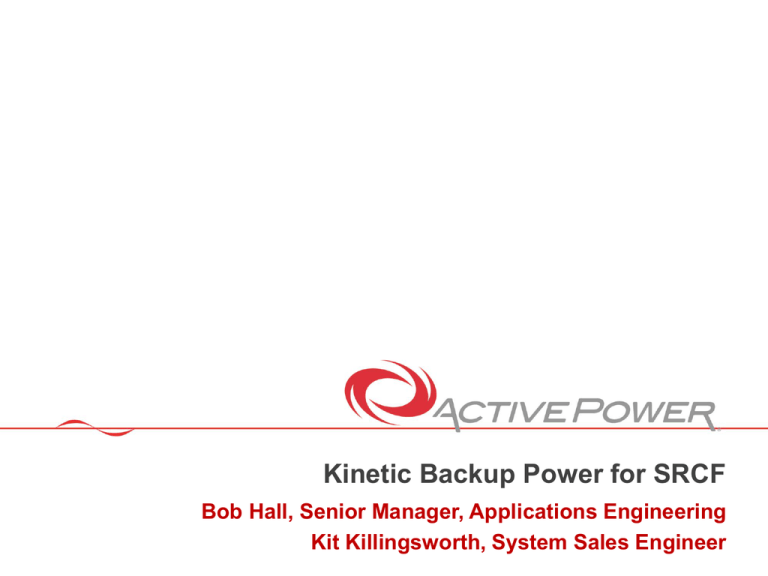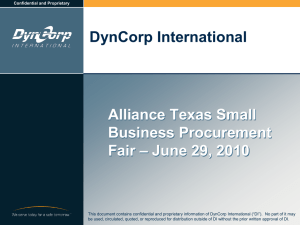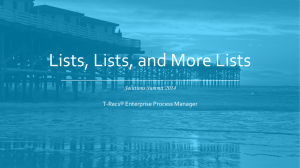Kinetic Backup Power for SRCF
advertisement

Kinetic Backup Power for SRCF Bob Hall, Senior Manager, Applications Engineering Kit Killingsworth, System Sales Engineer Active Power Proprietary & Confidential – © 2013 Active Power, Inc. 1 Agenda » Introductions » Phil Reese’s Vision » Who is Active Power Products Product value proposition » The 415 VAC Data Center One Line Advantages to drive lower PUE Air side economizing » Technology Flywheel energy storage UPS parallel online topology TCO Active Power Proprietary & Confidential – © 2013 Active Power, Inc. 2 A Simple Idea and Vision » The vision of a single man can be a powerful, driving factor » The vision of Stanford to explore alternative solutions for their data center in both power and cooling Active Power Proprietary & Confidential – © 2013 Active Power, Inc. 3 Who is Active Power? » Active Power is a leading global manufacturer of uninterruptible power supply (UPS) systems and modular infrastructure solutions for data centers and other mission critical operations » Our products and services provide tangible operational advantages through an unmatched combination of power density, reliability, and total cost of ownership » Chosen by marquee customers around the world, we help them achieve their most forward thinking data center designs Global Customers Active Power Proprietary & Confidential – © 2013 Active Power, Inc. 4 Company Snapshot » Global Operation Centers » Overview Founded 1992; IPO 2000 NASDAQ: ACPW 23% average annual growth since 2005 57 country implementations 3,800+ flywheels shipped 160+ million hours of field runtime 900 MW power protection deployed » Innovation Patented flywheel technology 100+ global patents issued Austin, Texas (HQ) UK Germany China » Capabilities 9001:2008 ISO Manufacturing Packaging & Integration Services Design & Project Management Installation & Maintenance » Partners Active Power Proprietary & Confidential – © 2013 Active Power, Inc. 5 The Data Center Paradigm Shift to 415 VAC Active Power Proprietary & Confidential – © 2013 Active Power, Inc. 6 The 415V Data Center » MV – LV Transformation at UPS PDU A 1250KVA 5KV / 415V transformer feeds UPS 415V in/out of UPS Single phase 230V distributed server racks » Benefits Transform close to load still allows benefits of small MV cabling Eliminate PDU transformer cost and efficiency losses Reduce footprint of many PDUs 1250KVA 5KV 415VY/230V 1000 KVA 900KW CDB A 415/230V Active Power Proprietary & Confidential – © 2013 Active Power, Inc. 7 Major Savings in MV / 415V Distribution 4MW UPS project, expandable to 8 MW » Capex Reduced wiring cost by $250,000 dollars (14% of total installation) by providing MV as close to the load (point of transformation) as possible Eliminate 480:208V transformers in PDUs Reduced MV breakers by $360,000 (11% of total hardware) Reduced UPS / PDU space consumption by 50% » Opex Improve efficiency by 2-3% by eliminating transformation steps ($65,000 annual savings @ 3MW; $171,000 annual savings @ 8MW) Improve power supply (server) efficiency by 1.5-2% operating at higher voltage ($42,000 annual savings @ 3MW; $112,000 @ 8MW) Total annual savings of $239,000 @ 3MW; $635,000 @ 8MW) Lower losses = less cooling required Active Power Proprietary & Confidential – © 2013 Active Power, Inc. 8 SRCF Abbreviated SLD Active Power Proprietary & Confidential – © 2013 Active Power, Inc. 9 PUE – Power Usage Effectiveness PUE = Total Facility Power IT Equipment Power How PUE is changing the topologies, functions, and characteristics of UPS in the data center space 10 Active Power Proprietary & Confidential – © 2013 Active Power, Inc. 10 More on PUE » Power usage effectiveness (PUE) is a measure of how efficiently a data center uses its power; specifically, how much of the power is actually used by the computing equipment » PUE is the inverse of data center infrastructure efficiency (DCIE). » An ideal PUE is 1.0 » Anything that isn't considered a computing device in a data center (i.e., lighting, cooling, etc.) falls into the category of facility power usage 11 Active Power Proprietary & Confidential – © 2013 Active Power, Inc. 11 Value Propositions to Drive Lower PUE » Medium Voltage Application » Highly Efficient, Up to ~98% » Minimal if any AC needed for the UPS, will operate up to 104 F without derating » Half the heat rejection of legacy UPS » No special room needed – less construction cost » Power Dense – twice the power in half the space » Lower overall maintenance cost » Air side economizing for facility Active Power Proprietary & Confidential – © 2013 Active Power, Inc. 12 Utility Savings of Highly Efficient UPS Traditional Double Conversion UPS $ 0.10 0.1 X 0.06 kW load 2400 0.94 Traditional UPS Efficiency 94% Active Power CleanSource UPS Active Power UPS Efficiency 97% $ / kW/hr. X 2400 X 8760 = $ 134,194 8760 = $ 65,022 0.1 X 0.03 X 2400 X 0.97 Utility savings per year: $ 69,172 Active Power Proprietary & Confidential – © 2013 Active Power, Inc. 13 UPS Technology and Product Overview to Achieve Lowest PUE and TCO Active Power Proprietary & Confidential – © 2013 Active Power, Inc. 14 Power Dense and Reliable » Modular * Scalable * Flexible » Field Upgradeable * Grows with IT and Business Needs » Paralleling Capability for Multi-Megawatt Solutions 600 kVA 900 kVA 1200 kVA 300 kVA Active Power Proprietary & Confidential – © 2013 Active Power, Inc. 15 CleanSource UPS Multi-Module Systems – Z Series MMS One-line Dual Input Option MBP External Only Input Isolation Switches System Cabinet Built in: AC DC AC DC AC DC AC DC DC AC DC AC DC AC DC AC • • • Maintainability Scalability Redundancy Output Isolation Switches System Cabinet Active Power Proprietary & Confidential – © 2013 Active Power, Inc. 16 Flywheel UPS Parallel Online Architecture Static Bypass • • • • • • • Harmonic Current Conditions power to load Voltage regulation Power Factor correction Harmonic cancellation Low input current distortion Overload capability Unlimited cycling Active Power Proprietary & Confidential – © 2013 Active Power, Inc. 17 Total Cost of Ownership (TCO) » Lower installation costs Flywheel and communication cables as well as wire way provided » Efficiency – up to 98% » Minimal cooling requirements Less heat rejection » Small footprint, power dense » Low maintenance costs » No battery cooling required » No battery changes » A KNOWN Energy Source Active Power Proprietary & Confidential – © 2013 Active Power, Inc. 18 Active Power Proprietary & Confidential – © 2013 Active Power, Inc. 19







